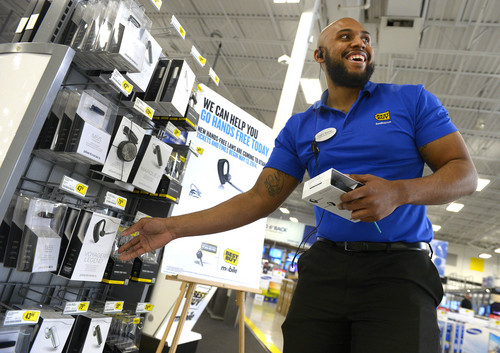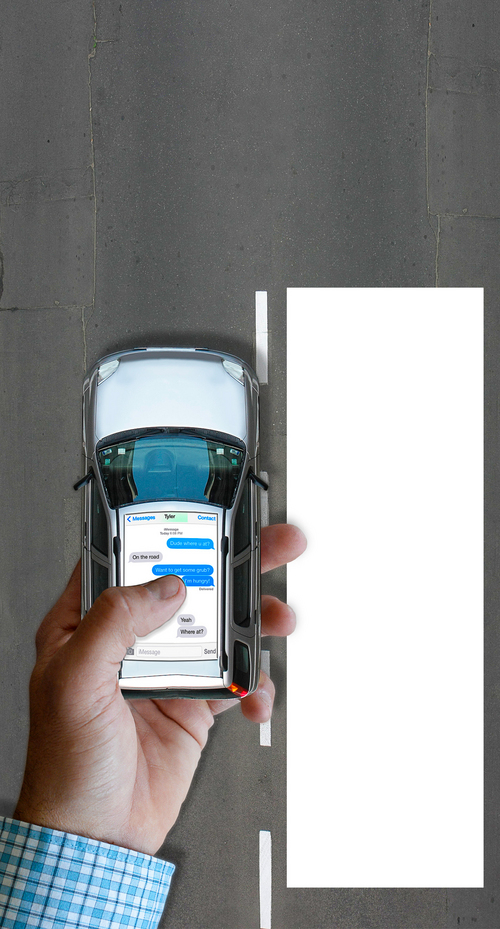This is an archived article that was published on sltrib.com in 2014, and information in the article may be outdated. It is provided only for personal research purposes and may not be reprinted.
Loopholes that allowed Utah drivers to text or dial cellphones are about to disappear Tuesday when a new state law takes effect.
"Right now, the law against texting is mostly unenforceable because it specifically highlights texting and not much more," says Sen. Stephen Urquhart, R-St. George, who sponsored SB253 to change that.
Sgt. Todd Royce, spokesman for the Utah Highway Patrol, says the current law is easily twisted.
"When we stopped a vehicle for texting and driving, the person who was stopped would say, 'Well, I was just calling somebody' " — which was legal, so they would escape the ticket.
The new law outlaws manipulating by hand a cellphone or any other portable electronic device while driving. That includes texting, dialing a phone or even changing music on a smartphone.
"Most people welcome this law because we see the effects of it every day," Royce says. "Everybody's seen it: that person driving down the road next to you that has the cellphone resting on their steering wheel and they are using their thumbs to type or dial a phone number. Now that will be illegal."
The distinction in the current law isn't based on logic, he adds.
"The motion to dial a phone number and the motion to text is the same distraction."
On Tuesday, violation of the revised distracted-driving law will become a class C misdemeanor, punishable by a fine of up to $100. It will be a class B misdemeanor, carrying a fine of up to $1,000, if it leads to injuring someone.
—
Questions • Urquhart and Royce say they are getting plenty of questions about exactly what the new law will and will not allow.
"To talk on your cellphone is still OK. To have your cellphone up to your ear is OK," Royce says. But manually dialing, texting or even adjusting music on that hand-held device is illegal.
Urquhart says some have questioned the wisdom of continuing to allow talking on a hand-held phone. "My thought is that talking on a phone is not a big problem because that's like talking to someone next to you in the vehicle. We typically can talk on the phone and pay attention to what's going on around us."
But, he adds, "When we take our eyes off the road and look down at the device, we have issues."
However, research by University of Utah psychology professor David Strayer indicates that drivers who talk on handheld or hands-free cellphones are as impaired as drunken drivers. He says conversation itself — not just manipulation of a handheld phone — distracts drivers from road conditions.
Royce says there are nuances in the law people will have to get used to.
"A lot of people have questions of, 'What if I am at a stoplight, or what if I am not moving in my vehicle?' The law reads the vehicle has to be in motion."
The law also allows manipulating electronics built into the dashboard, such as OnStar or stereo decks that connect to cellphones via wireless Bluetooth frequencies.
"Those are built with safety in mind where your eyes aren't off the road as much as if you were looking down at your lap," Urquhart says, adding he sees it as akin to working a dashboard radio.
The senator also says the new law has a "pretty significant exemption" to allow using portable devices with GPS for directions. "We'll see how that works out. The thinking is that people driving around lost often are as dangerous as people manipulating a device."
He says he and other lawmakers plan to evaluate how well the law works. "We might have to come back and change a thing or two, but I'm excited to see how it works. I'm hopeful it will not inconvenience people too much and will help save life and limb."
—
Hands-free devices • It is also increasing sales of hands-free cellphone devices to help comply with the new law.
"The demand is huge right now," says Cedric Reeves, special sales manager for connection devices at the South Salt Lake Best Buy. The store even has a big sign at the front door warning customers about the new law, with an adjacent display of hands-free Bluetooth earphones and mics for phones.
"We have a lot of people coming in looking for solutions right now," including installing either new stereo decks or devices to help factory-installed radio systems connect via wireless Bluetooth frequencies to cellphones.
"That helps with the complaint, 'I can't even change the music on the phone anymore without getting pulled over.' Hook it up to a Bluetooth to your car deck, and you're good to go," Reeves says.
"They even come with a little mic."
The imminent change in law prompted him to buy a Bluetooth device, he adds, mostly for the music on his smartphone.
"I didn't think it would make that much difference, just looking down for a second to change a tune," he says. "But since I bought mine, I notice that it does make a difference, and it makes driving easier."
Urquhart was urged to push the bill by Leslee Henson. Last year, she and her husband were struck while walking in St. George in a multi-car accident caused by a driver who was texting.
Her husband was killed. Leslee suffered fractures to her neck and back, plus head trauma that led to 5,000 stitches and staples in her skull and separated nerves in her eyes. She has spent the past year fighting texting while driving.
"The texting law now is just too vague. It's too hard to enforce," she told lawmakers earlier this year. —
Toughening Utah's ban on texting while driving
A law taking effect Tuesday will BAN:
• Manipulating a cellphone or portable electronic device by hand while driving, including texting, dialing a phone number or changing music.
It will still ALLOW:
• Talking on a hand-held cellphone.
• Manipulating a device if a car is not moving, such as at a stoplight.
• Using GPS on an electronic device for directions.
• Manipulating in-dash electronics.





